All reports
Mantle cell lymphoma
·
Jan 16, 2025
Diagnosis to empowerment: questions to ask and steps to take after being diagnosed with MCL
Navigating Mantle Cell Lymphoma: Understanding Your Diagnosis, Treatment Options, and Steps Toward Empowerment and Hope
Reports are in beta and continually improving. They are not a substitute for professional medical advice. Please contact us to give feedback.
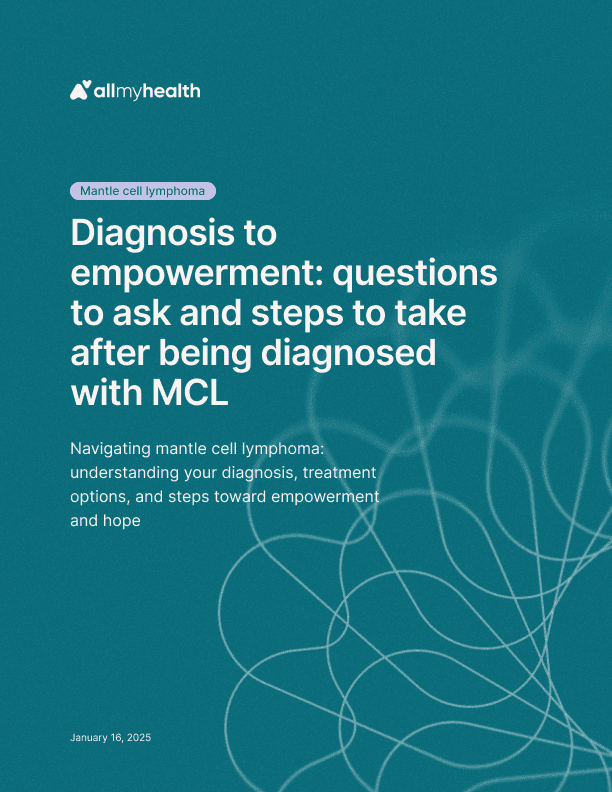
Stay informed
This report was published in our weekly newsletter and on our community page. Follow to stay up to date with the latest news and research relevant to your condition.
Introduction
Being diagnosed with Mantle Cell Lymphoma (MCL) can be overwhelming. This guide aims to provide you with clear and easy-to-understand information about MCL and empower you to take control of your health. We'll explore what MCL is, how it's diagnosed, and the treatment options available. We'll also provide you with essential questions to ask your doctor and practical steps to take after your diagnosis to feel more empowered and confident in navigating this journey.
Understanding Mantle Cell Lymphoma (MCL)
Mantle cell lymphoma (MCL) is a type of cancer that affects white blood cells called lymphocytes, which are an important part of your immune system and help your body fight infections [1]. MCL is a subtype of non-Hodgkin's lymphoma [1]. It develops in the "mantle zone" of the lymph nodes, which is the area surrounding certain structures inside the lymph nodes [3]. MCL accounts for roughly 6% of all non-Hodgkin lymphoma cases in the United States [4].
In MCL, some of your lymphocytes change into cancer cells and multiply rapidly [1]. These cells can form tumors in your lymph nodes and other parts of your body, such as your bone marrow, spleen, and digestive system [1].
How is MCL Diagnosed?
Diagnosing MCL typically involves a biopsy, a minor procedure where a small tissue sample is taken from a swollen lymph node or other affected area [6]. If MCL has spread to the blood, a blood test may be used for diagnosis [6]. MCL is often diagnosed after routine blood work shows a high number of lymphocytes or when a doctor discovers a swollen lymph node during an unrelated physical exam [8].
Your doctor may also recommend imaging tests, such as CT scans, PET scans, or MRI scans, to determine the stage of your cancer and see how far it has spread [9]. In addition to these tests, your doctor will likely order laboratory tests, such as a complete blood count (CBC) with differential, to measure the number of red blood cells, white blood cells, and platelets in your blood [5].
More than 90% of patients with MCL have an overproduction of a protein called cyclin D1 in their lymphoma cells. Doctors can check for high levels of cyclin D1 in a biopsy sample, making it a very reliable way to help diagnose MCL [4].
Treatment Options for MCL
There are several treatment options available for MCL, and the best approach for you will depend on factors such as the stage of your cancer, your overall health, and your personal preferences [10]. While chemotherapy alone used to be the main treatment option, due to related side effects and relapse rates, other approaches are typically used [3]. Treatment options may include:
Watchful Waiting: If your MCL is slow-growing and not causing significant symptoms, your doctor may recommend monitoring the disease without immediate treatment [5].
Chemotherapy: This treatment uses drugs to destroy cancer cells [5]. Chemotherapy regimens used alongside rituximab, a drug designed to target a specific protein found on the outside of B-cells, tend to be aggressive and involve several different drugs [11].
Immunotherapy: This treatment helps your immune system fight cancer cells more effectively [3].
Targeted Therapy: This treatment uses drugs that specifically target cancer cells while minimizing damage to healthy cells [12].
Radiation Therapy: For patients with minimal spread of MCL, which is rare, radiation therapy may be an option [11]
Stem Cell Transplant: This procedure involves replacing damaged bone marrow with healthy stem cells [5].
Questions to Ask Your Doctor After an MCL Diagnosis
It's essential to have open and honest communication with your doctor throughout your MCL journey. Here are some important questions to ask after your diagnosis:
What is the stage of my MCL, and what does that mean?
What are my treatment options, and what are the potential benefits and risks of each?
What is the goal of treatment in my case – to cure the cancer, control it, or relieve symptoms?
What are the potential side effects of treatment, and how can they be managed?
Will I need to make any lifestyle changes during or after treatment?
What is the long-term outlook for my condition?
Are there any clinical trials that I might be eligible for?
What kind of support services are available to me and my family?
Living with MCL
In addition to the questions above, it's also important to ask your doctor about the practical aspects of living with MCL. Here are some questions to consider:
Will my MCL aggravate with specific weekly chores such as taking out the trash, washing the car, walking the dog, or carrying groceries [13]?
Can you explain the pain I'm feeling [13]?
If my MCL requires me to rest, what exercises can I still do to stay in shape [13]?
What modifications can you suggest so I can still exercise safely [13]?
Do the medications or supplements I'm taking have side effects or disadvantages [13]?
Are there nutritional supplements or dietary changes you'd suggest [13]?
Steps to Take After an MCL Diagnosis
After receiving an MCL diagnosis, it's natural to feel overwhelmed and uncertain. Here are some steps you can take to feel more empowered and in control:
Educate Yourself: Learn as much as you can about MCL from reliable sources, such as your doctor, reputable websites like the Lymphoma Research Foundation (lymphoma.org) and the Leukemia & Lymphoma Society (lls.org), and support groups. Understanding your condition can help you make informed decisions about your care.
Build a Support Network: Connect with family, friends, and other people with MCL. Sharing your experiences and feelings can provide emotional support and practical advice. Consider joining a support group, either in person or online, to connect with others who understand what you're going through.
Communicate with Your Healthcare Team: Don't hesitate to ask questions, express your concerns, and share any changes in your symptoms. Open communication with your doctor and other healthcare providers is crucial for ensuring you receive the best possible care.
Maintain a Healthy Lifestyle: Eat a balanced diet, get regular exercise as appropriate for your condition, and prioritize rest to support your overall well-being. A healthy lifestyle can help you cope with treatment side effects and improve your quality of life.
Focus on Your Emotional Health: Consider counseling, support groups, or relaxation techniques to manage stress and anxiety. A cancer diagnosis can bring a range of emotions, and it's important to take care of your mental health as well as your physical health.
Keep a Journal: Documenting your experiences, thoughts, and feelings can be a helpful way to process your emotions and track your progress. It can also be a valuable tool for communicating with your healthcare team.
Advocate for Yourself: Be an active participant in your care by asking questions, seeking second opinions when needed, and making informed decisions about your treatment. You are your own best advocate, so don't be afraid to speak up for your needs and preferences.
Inspirational Stories
Many people with MCL have gone on to live full and productive lives. Here are a few inspiring stories:
Cheryl: Diagnosed with MCL in 2005, Cheryl underwent chemotherapy, radiation, and a stem cell transplant. She remains in remission and volunteers with the Leukemia & Lymphoma Society [15].
Michael: Michael was diagnosed with MCL in 2007. Despite facing challenges, he remains optimistic and cherishes time with his family [16].
Yolanda: Diagnosed with Stage 4 MCL in 2020, Yolanda underwent chemotherapy and achieved remission. She now volunteers with the Leukemia & Lymphoma Society to support others with blood cancer [17].
These stories demonstrate the resilience and hope that are possible after an MCL diagnosis.
Resources and Support Groups
Connecting with others who understand what you're going through can be invaluable. Here are some resources and support groups for people with MCL:
The Leukemia & Lymphoma Society (LLS): This organization provides information, support, and financial assistance to people with blood cancers [18].
The Lymphoma Research Foundation: This foundation offers educational resources, support groups, and financial assistance programs [19].
CancerCare: This organization provides free professional support services, including counseling and financial assistance [20].
The American Cancer Society: This society offers a wide range of resources, including information, support groups, and transportation assistance [19].
Online Support Groups: Several online communities and forums allow you to connect with other people with MCL and share experiences and support [21].
Clinical Trials
Clinical trials are research studies that test new treatments and approaches to cancer care. Participating in a clinical trial can give you access to promising new therapies and contribute to advancing MCL research [22]. For example, clinical trials are currently testing the effectiveness of zanubrutinib, a drug that may stop the growth of cancer cells by blocking some of the enzymes needed for cell growth [23]. Your doctor can help you determine if a clinical trial is right for you.
Latest Research on MCL
Researchers are constantly working to improve MCL treatments and outcomes [24]. Some areas of active research include:
Targeted Therapies: Scientists are developing new drugs that specifically target MCL cells while sparing healthy cells [25].
Immunotherapy: Researchers are exploring new ways to harness the power of the immune system to fight MCL [25].
Epigenetic Agents: These agents can alter gene expression and may offer new treatment options for MCL [25].
Minimal Residual Disease (MRD) Testing: This testing can detect tiny amounts of cancer cells after treatment and help predict the risk of relapse [26].
Prognosis for MCL
The prognosis for MCL varies depending on several factors, including the stage of the disease, your overall health, and the specific treatments you receive [5]. While MCL is generally considered an aggressive lymphoma, advancements in treatment have led to improved outcomes in recent years [27]. Approximately 10-15% of MCL patients are considered low-risk and can be managed with a watch and wait approach to monitor the disease [28].
The average life expectancy of patients with mantle cell lymphoma is about 6 to 7 years, while the 10-year survival rate is 5 to 10 percent [29]. It's important to discuss your individual prognosis with your doctor, who can provide you with personalized information and support.
Conclusion
A diagnosis of Mantle Cell Lymphoma can be life-changing, but it's important to remember that you are not alone. It's okay to feel scared or overwhelmed. By understanding your condition, asking the right questions, and taking proactive steps, you can navigate this journey with confidence and empowerment. Remember to lean on your support network, communicate with your healthcare team, and focus on your overall well-being. With advancements in treatment and the support of your loved ones, you can live a fulfilling life with MCL. Remember to reach out for support when you need it and actively participate in your care by making informed decisions about your treatment in partnership with your healthcare team.
References
1. Mantle Cell Lymphoma (MCL): Causes, Symptoms, Treatment, and More - WebMD, https://www.webmd.com/cancer/lymphoma/mantle-cell-lymphoma
2. en.wikipedia.org, https://en.wikipedia.org/wiki/Mantle_cell_lymphoma
3. Mantle Cell Lymphoma - MD Anderson Cancer Center, https://www.mdanderson.org/cancer-types/non-hodgkin-lymphoma/mantle-cell-lymphoma.html
4. Mantle Cell Lymphoma, https://lymphoma.org/understanding-lymphoma/aboutlymphoma/nhl/mantle-cell-lymphoma/
5. Mantle Cell Lymphoma: Symptoms, Treatment & Prognosis - Cleveland Clinic, https://my.clevelandclinic.org/health/diseases/24030-mantle-cell-lymphoma
6. lymphoma-action.org.uk, https://lymphoma-action.org.uk/types-lymphoma-non-hodgkin-lymphoma/mantle-cell-lymphoma#:~:text=Mantle%20cell%20lymphoma%20is%20typically,diagnosed%20through%20a%20blood%20test.
7. Mantle cell lymphoma, https://lymphoma-action.org.uk/types-lymphoma-non-hodgkin-lymphoma/mantle-cell-lymphoma
8. What to know about mantle cell lymphoma, https://www.mdanderson.org/cancerwise/what-to-know-about-mantle-cell-lymphoma-symptoms-diagnosis-and-treatment.h00-159385101.html
9. Mantle Cell Lymphoma - City of Hope, https://www.cityofhope.org/clinical-program/non-hodgkin-lymphoma/types/mantle-cell-lymphoma
10. Mantle Cell Lymphoma - Moffitt Cancer Center, https://www.moffitt.org/cancers/lymphomas-hodgkin-and-non-hodgkin/diagnosis/types/mantle-cell-lymphoma/
11. Mantle cell lymphoma (MCL) - Cancer Treatment Centers of America, https://www.cancercenter.com/cancer-types/non-hodgkin-lymphoma/types/mantle-cell-lymphoma
12. Mantle Cell Lymphoma Treatment | UVA Health, https://uvahealth.com/services/blood-cancer/mantle-cell-lymphoma
13. 12 Post-Injury Questions to Ask Your Physician - Canyon Ranch, https://www.canyonranch.com/well-stated/post/12-post-injury-questions-to-ask-your-physician/
14. How to Treat MCL Sprains, https://carespace.health/post/how-to-treat-mcl-sprains/
15. Cherylinn, Mantle Cell Lymphoma Survivor, https://lymphoma.org/storiesofhope/cherylinnsoh/
16. Michael, Mantle Cell Lymphoma Survivor, https://lymphoma.org/storiesofhope/michael-mantle-cell-lymphoma/
17. Yolanda | Leukemia and Lymphoma Society, https://www.lls.org/story/yolanda-2
18. Mantle Cell Lymphoma, https://www.lls.org/booklet/mantle-cell-lymphoma
19. Finding Support for Mantle Cell Lymphoma - Cancer - WebMD, https://www.webmd.com/cancer/support-for-mantle-cell-lymphoma
20. Mantle Cell Lymphoma, Cancer, Information, Resources, https://www.cancercare.org/diagnosis/mantle_cell_lymphoma
21. MCL Links - Mantle Cell Information, https://mclpage.org/mcllinks.html
22. Mantle Cell Lymphoma Clinical Research Trials | CenterWatch, https://www.centerwatch.com/clinical-trials/listings/condition/628/mantle-cell-lymphoma
23. Clinical Trials Using Zanubrutinib - NCI, https://www.cancer.gov/research/participate/clinical-trials/intervention/zanubrutinib
24. Mantle Cell Lymphoma | Clinical Oncology News - OncLive, https://www.onclive.com/clinical/mantle-cell-lymphoma
25. Future outlook of mantle cell lymphoma treatment - MedicalNewsToday, https://www.medicalnewstoday.com/articles/mantle-cell-lymphoma-treatment-future-outlook
26. Portell on the Changing Landscape of Mantle Cell Lymphoma - Targeted Oncology, https://www.targetedonc.com/view/portell-on-the-changing-landscape-of-mantle-cell-lymphoma
27. Mantle Cell Lymphoma Prognosis: What Is the Survival Rate | MyLymphomaTeam, https://www.mylymphomateam.com/resources/mantle-cell-lymphoma-prognosis-what-is-the-survival-rate
28. Mantle cell lymphoma (MCL) | Leukemia and Lymphoma Society, https://www.lls.org/research/mantle-cell-lymphoma-mcl
What Is the Life Expectancy of Someone with Mantle Cell Lymphoma? https://www.emedicinehealth.com/what_is_life_expectancy_of_mantle_cell_lymphoma/article_em.htm

Gaucher disease
·
Inclusion of Gaucher disease in newborn screening panels across the U.S.
Apr 9, 2025

Hemophilia
·
Qfitlia: A breakthrough in hemophilia treatment
Apr 3, 2025

Multiple myeloma
·
Navigating clinical trials in multiple myeloma
Apr 2, 2025

Gene and cell therapy
·
An introduction to cell therapy
Mar 25, 2025

Gene and cell therapy
·
An introduction to gene therapy
Mar 19, 2025

Amyotrophic lateral sclerosis
·
A guide to nutrition for patients with amyotrophic lateral sclerosis
Feb 26, 2025

Huntington's disease
·
A guide to nutrition for patients with Huntington's disease
Feb 26, 2025

Spinal muscular atrophy
·
A guide to nutrition for patients with spinal muscular atrophy
Feb 26, 2025
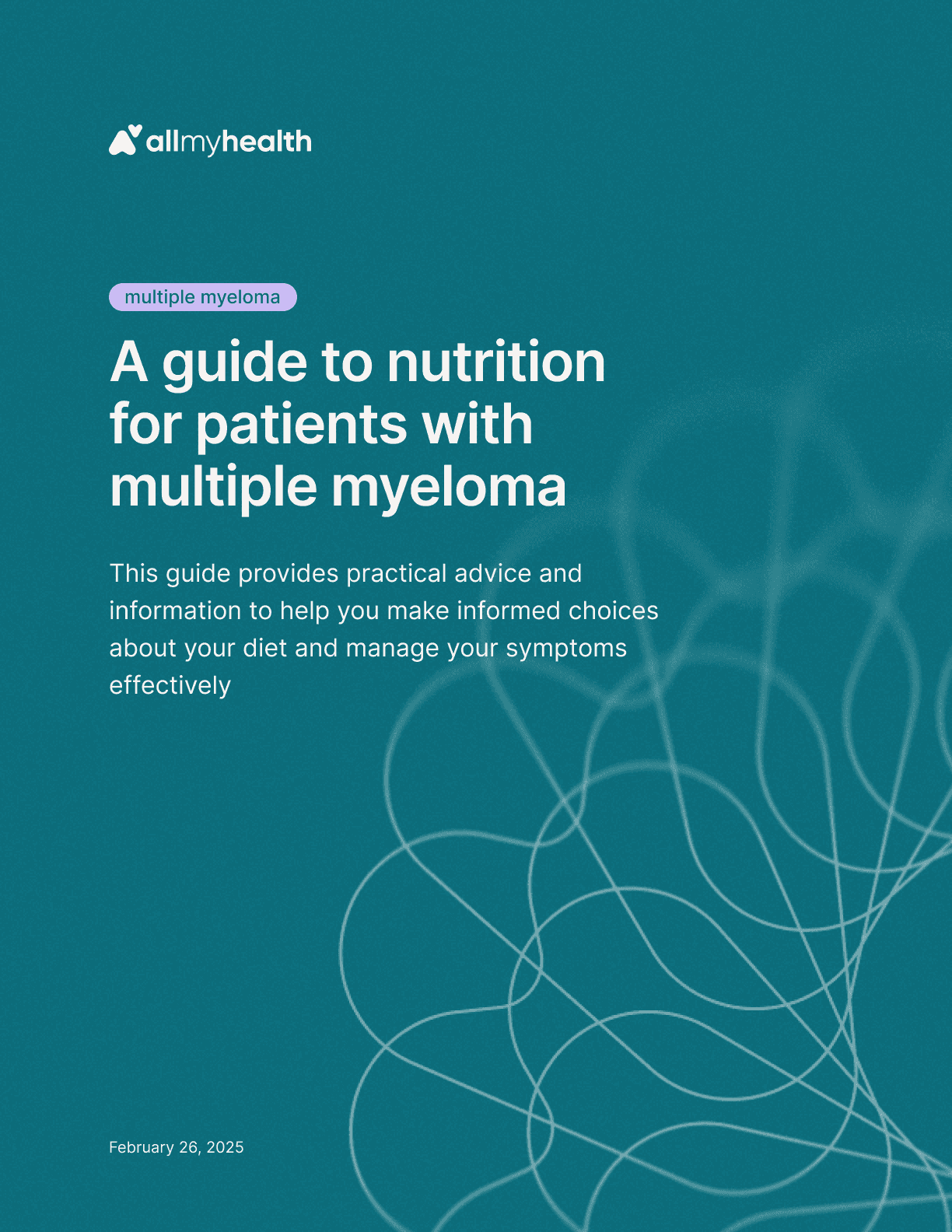
Multiple myeloma
·
A guide to nutrition for patients with multiple myeloma
Feb 26, 2025
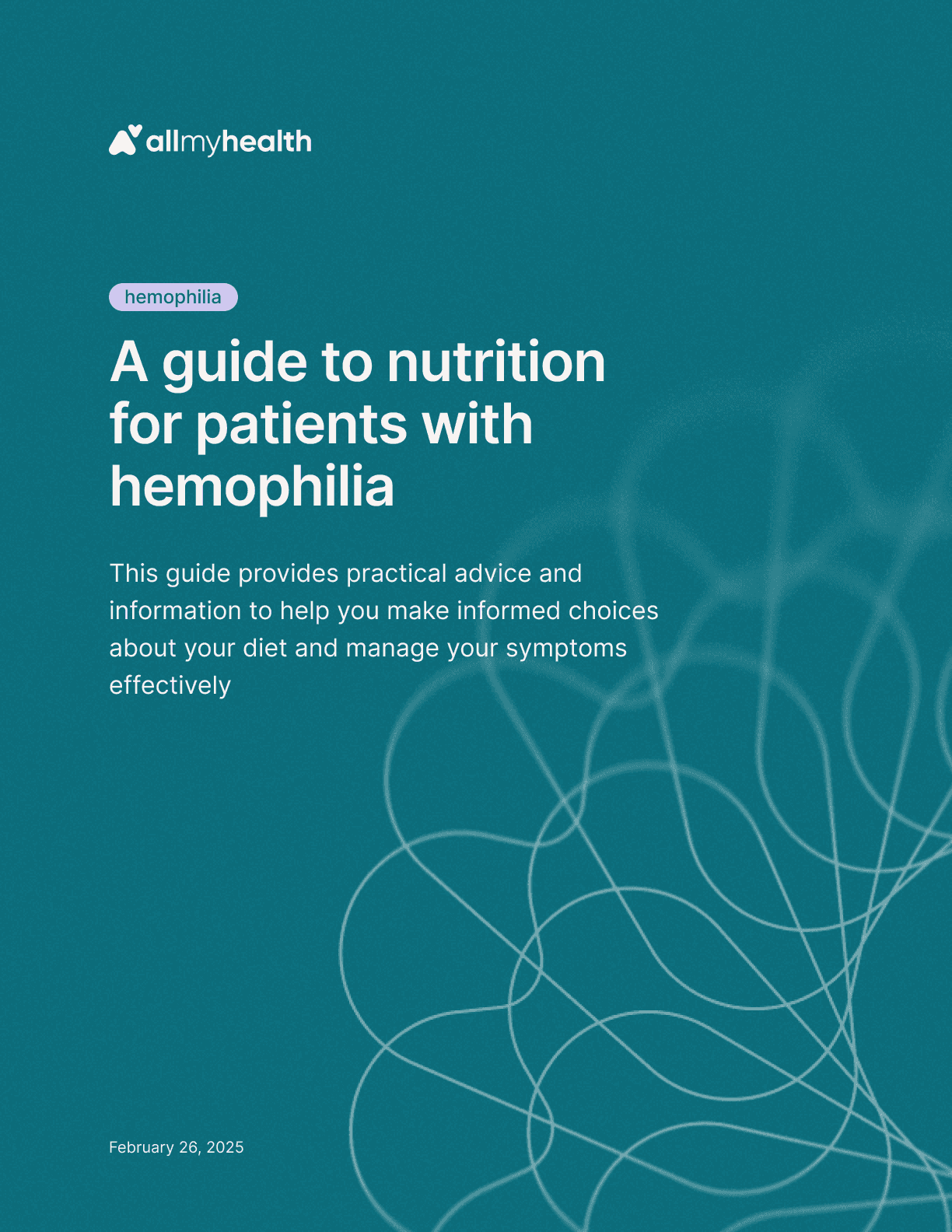
Hemophilia
·
A guide to nutrition for patients with hemophilia
Feb 26, 2025
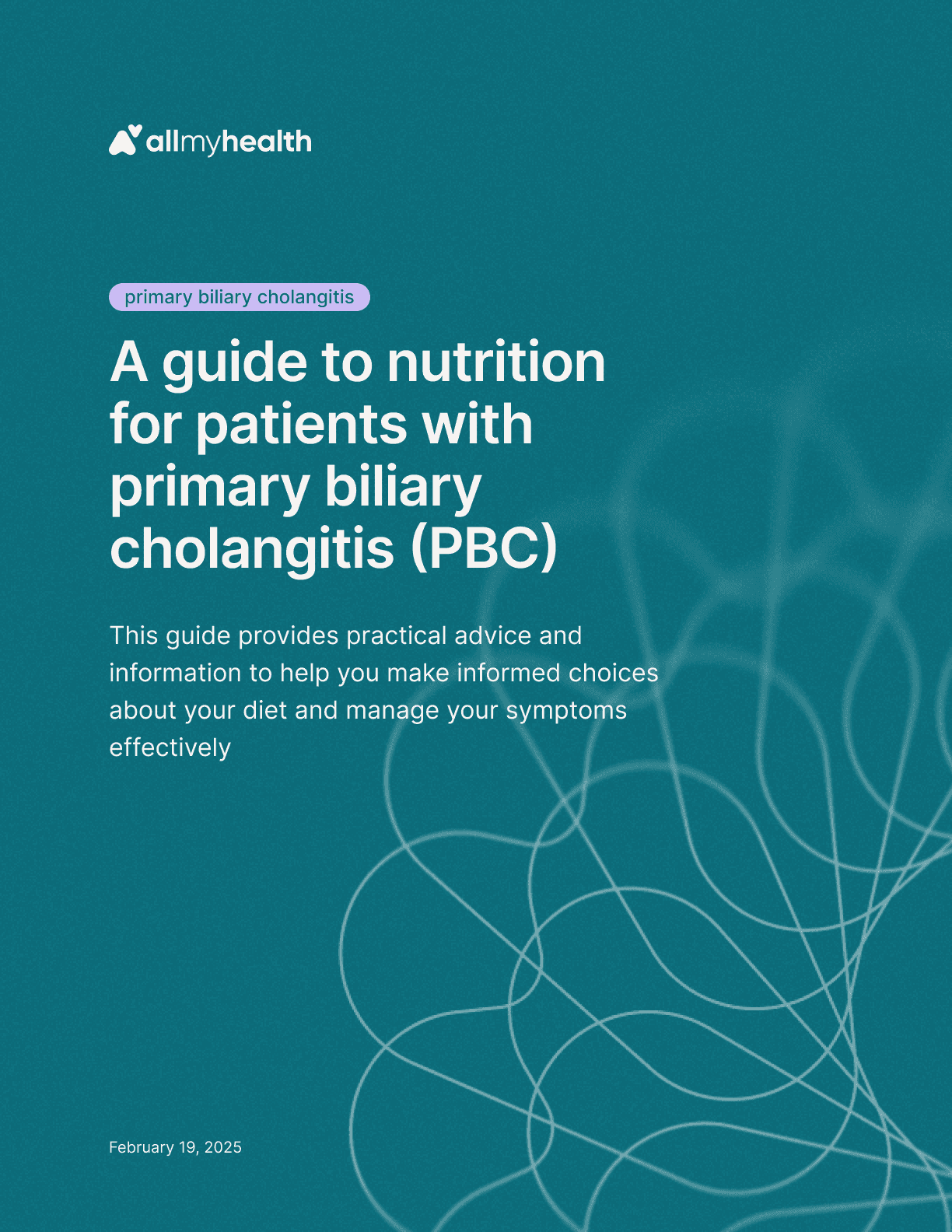
Primary biliary cholangitis
·
A guide to nutrition for patients with primary biliary cholangitis (PBC)
Feb 19, 2025

Duchenne muscular dystrophy
·
A guide to nutrition for patients with Duchenne muscular dystrophy
Feb 19, 2025

Friedreich's ataxia
·
A guide to nutrition for patients with Friedreich's ataxia
Feb 19, 2025
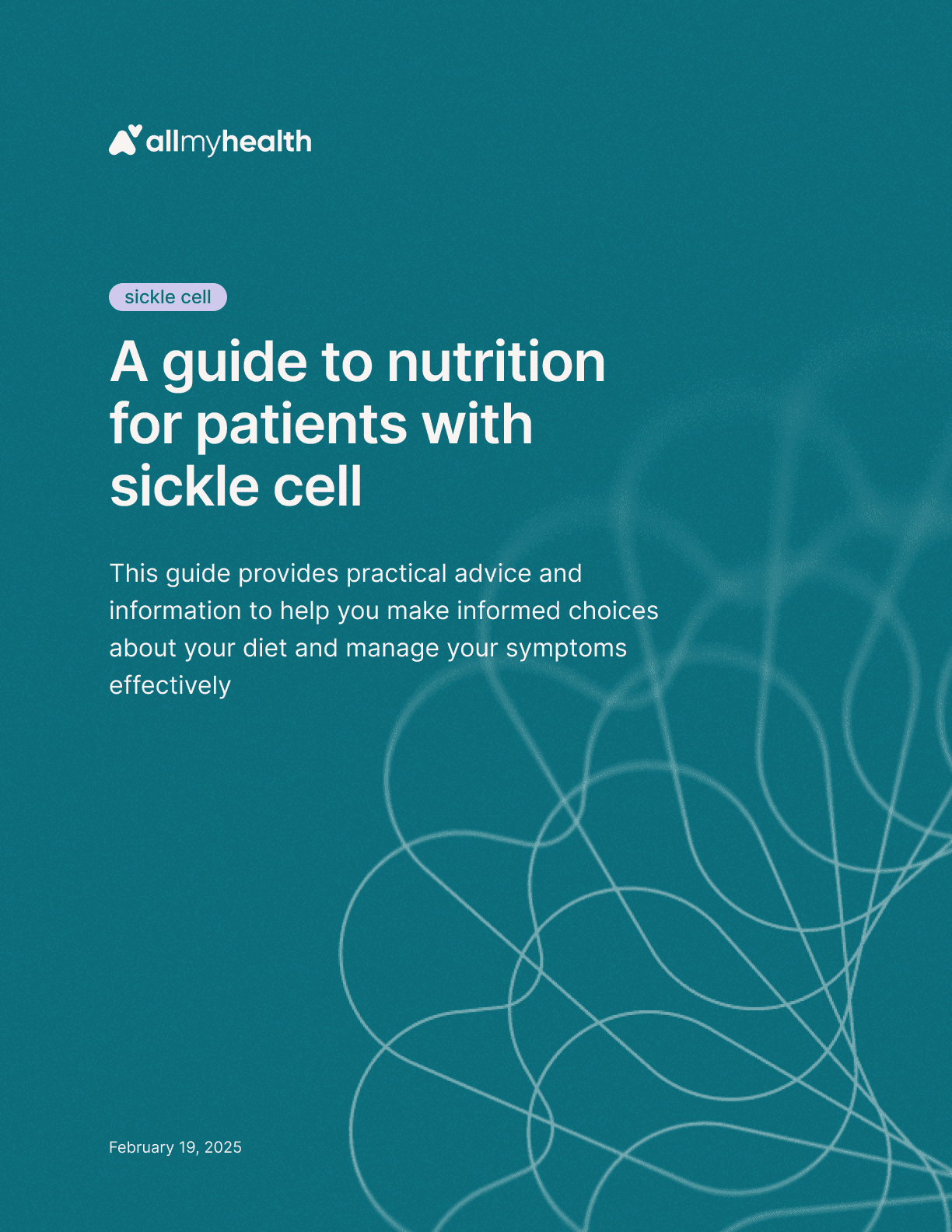
Sickle cell
·
A guide to nutrition for patients with sickle cell
Feb 19, 2025

Mantle cell lymphoma
·
A guide to nutrition for patients with mantle cell lymphoma
Feb 19, 2025
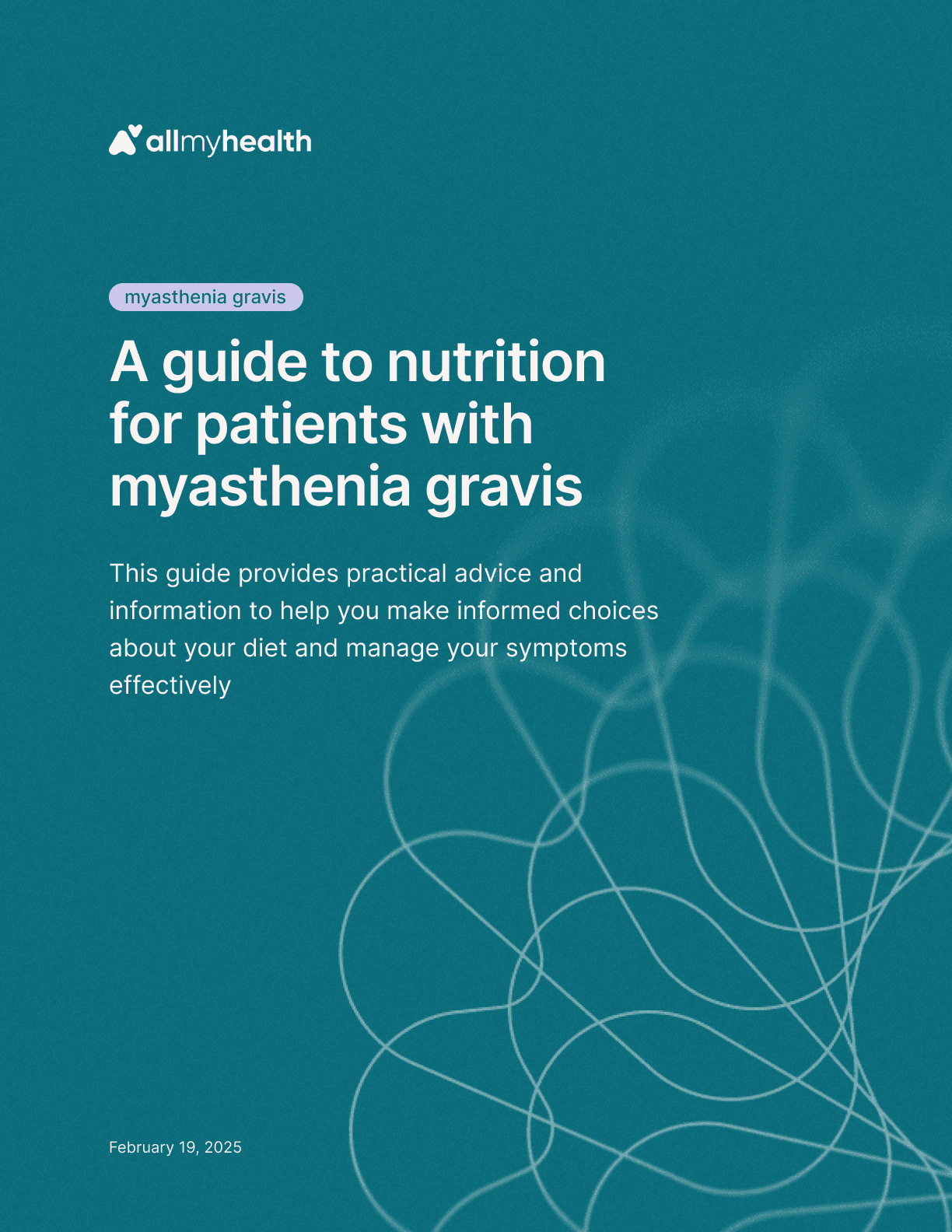
Myasthenia gravis
·
A guide to nutrition for patients with myasthenia gravis
Feb 19, 2025
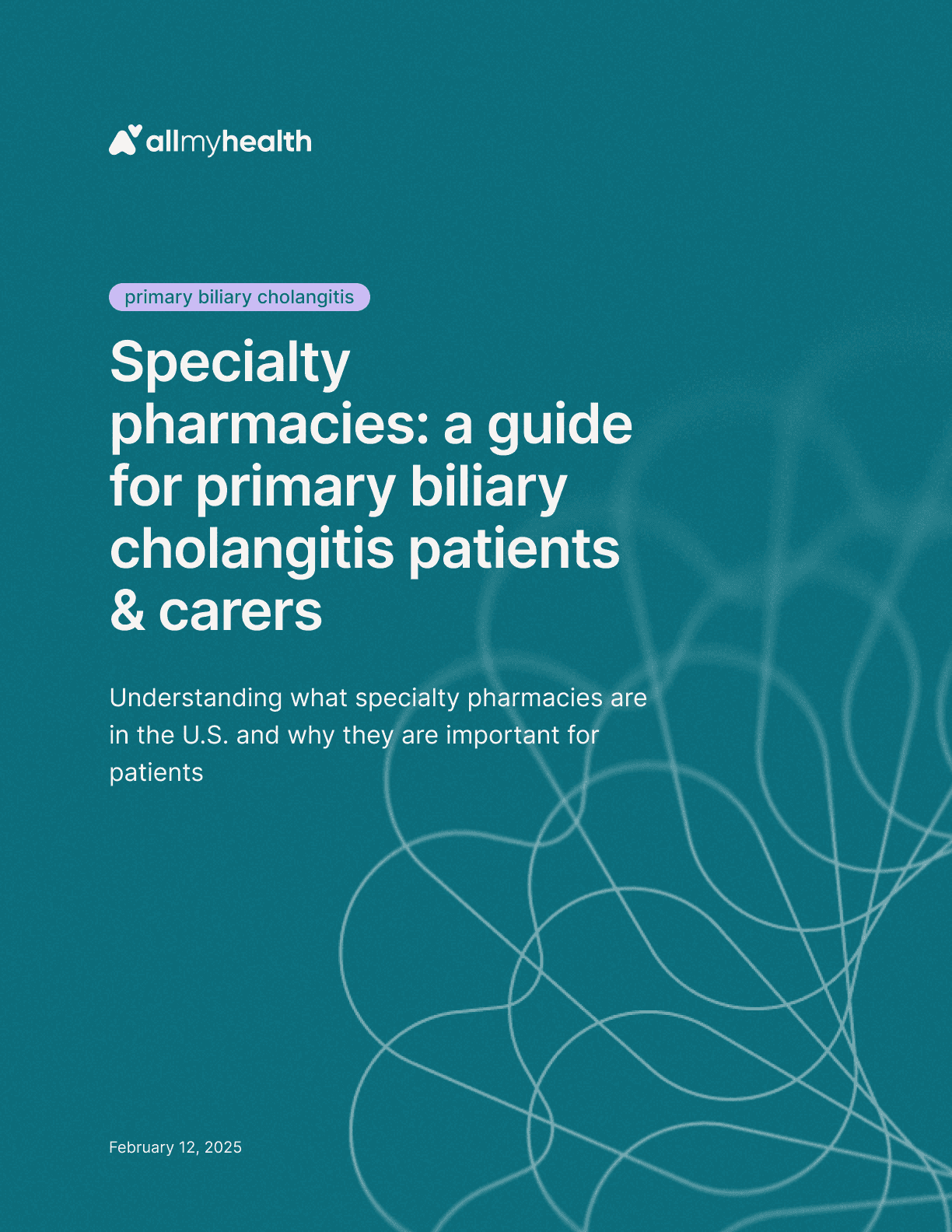
Primary biliary cholangitis
·
Specialty pharmacies: a guide for primary biliary cholangitis patients & carers
Feb 12, 2025
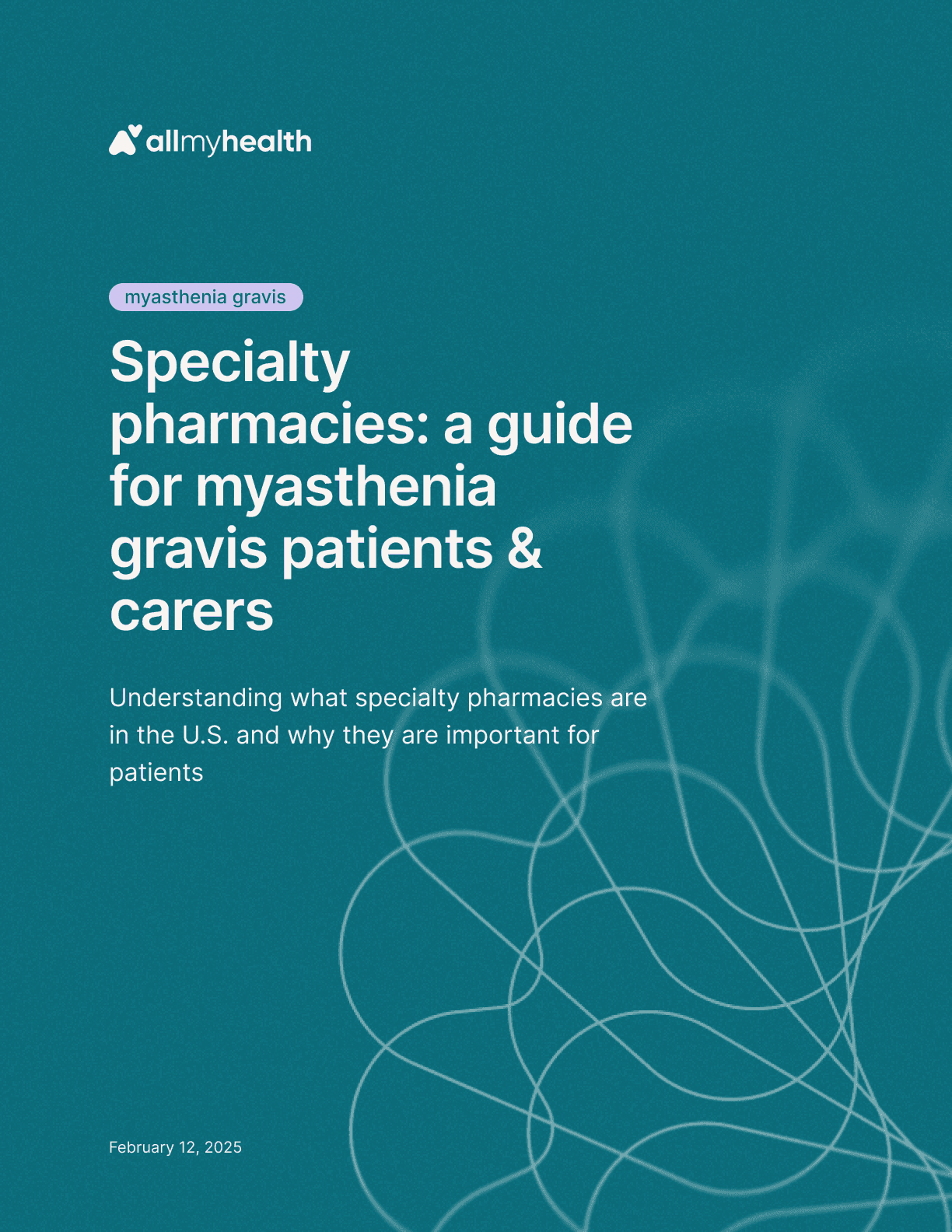
Myasthenia gravis
·
Specialty pharmacies: a guide for myasthenia gravis patients & carers
Feb 12, 2025

Mantle cell lymphoma
·
Specialty pharmacies: a guide for mantle cell lymphoma patients & carers
Feb 12, 2025

Friedreich's ataxia
·
Specialty pharmacies: a guide for Friedreich’s ataxia patients & carers
Feb 12, 2025

Duchenne muscular dystrophy
·
Specialty pharmacies: a guide for Duchenne muscular dystrophy patients & carers
Feb 12, 2025

Spinal muscular atrophy
·
Specialty pharmacies: a guide for SMA patients & carers
Feb 6, 2025
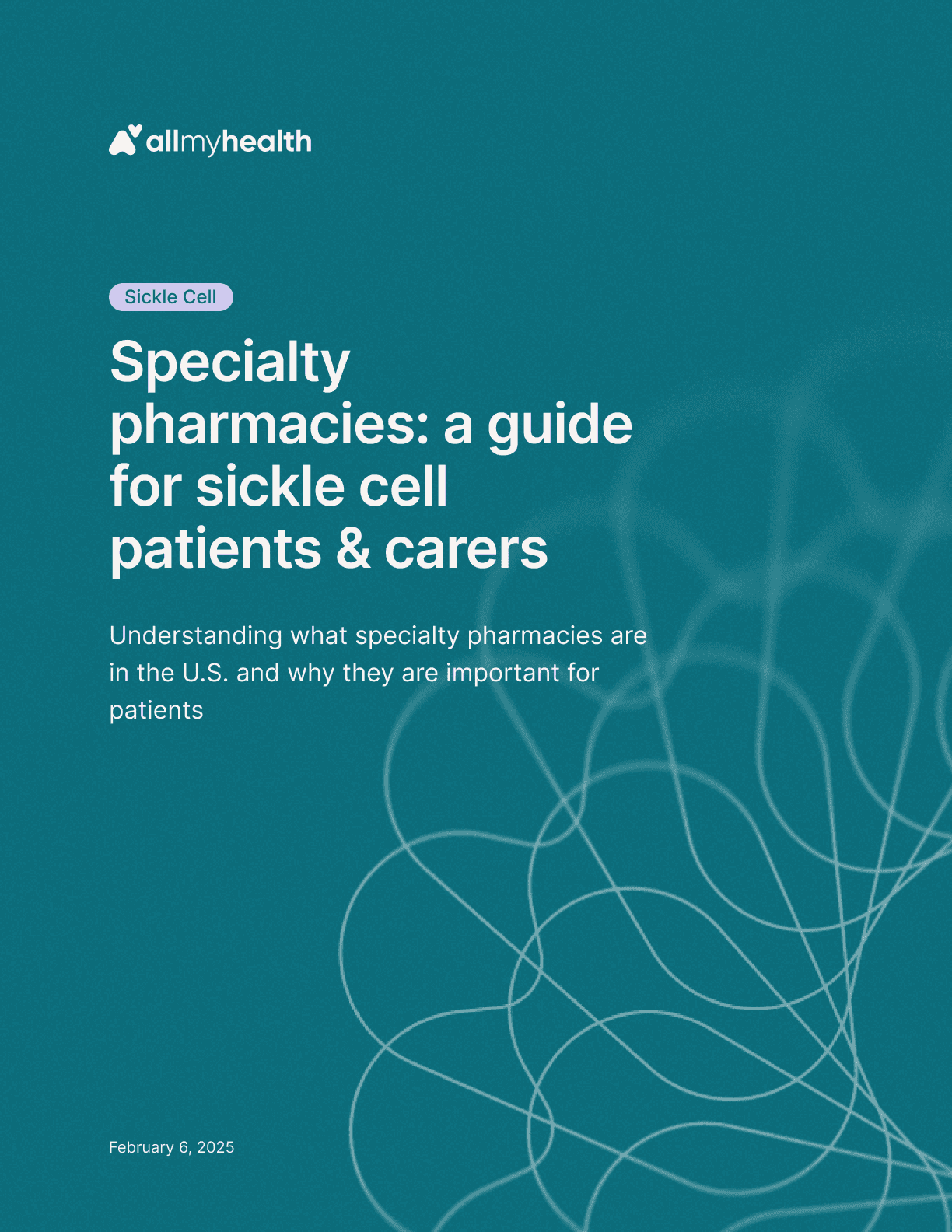
Sickle cell
·
Specialty pharmacies: a guide for sickle cell patients & carers
Feb 6, 2025
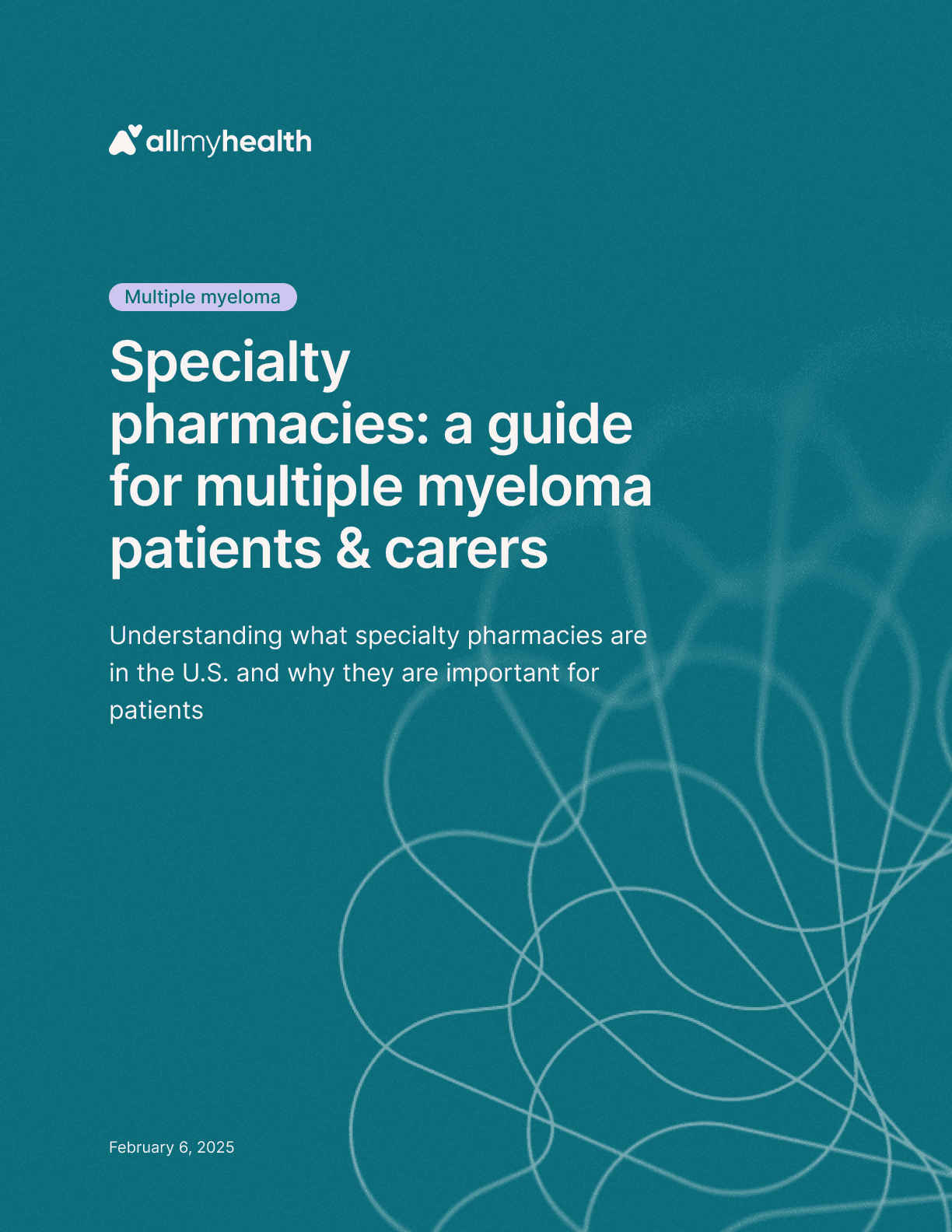
Multiple myeloma
·
Specialty pharmacies: a guide for multiple myeloma patients & carers
Feb 6, 2025

Huntington's disease
·
Specialty pharmacies: a guide for Huntington’s disease patients & carers
Feb 6, 2025
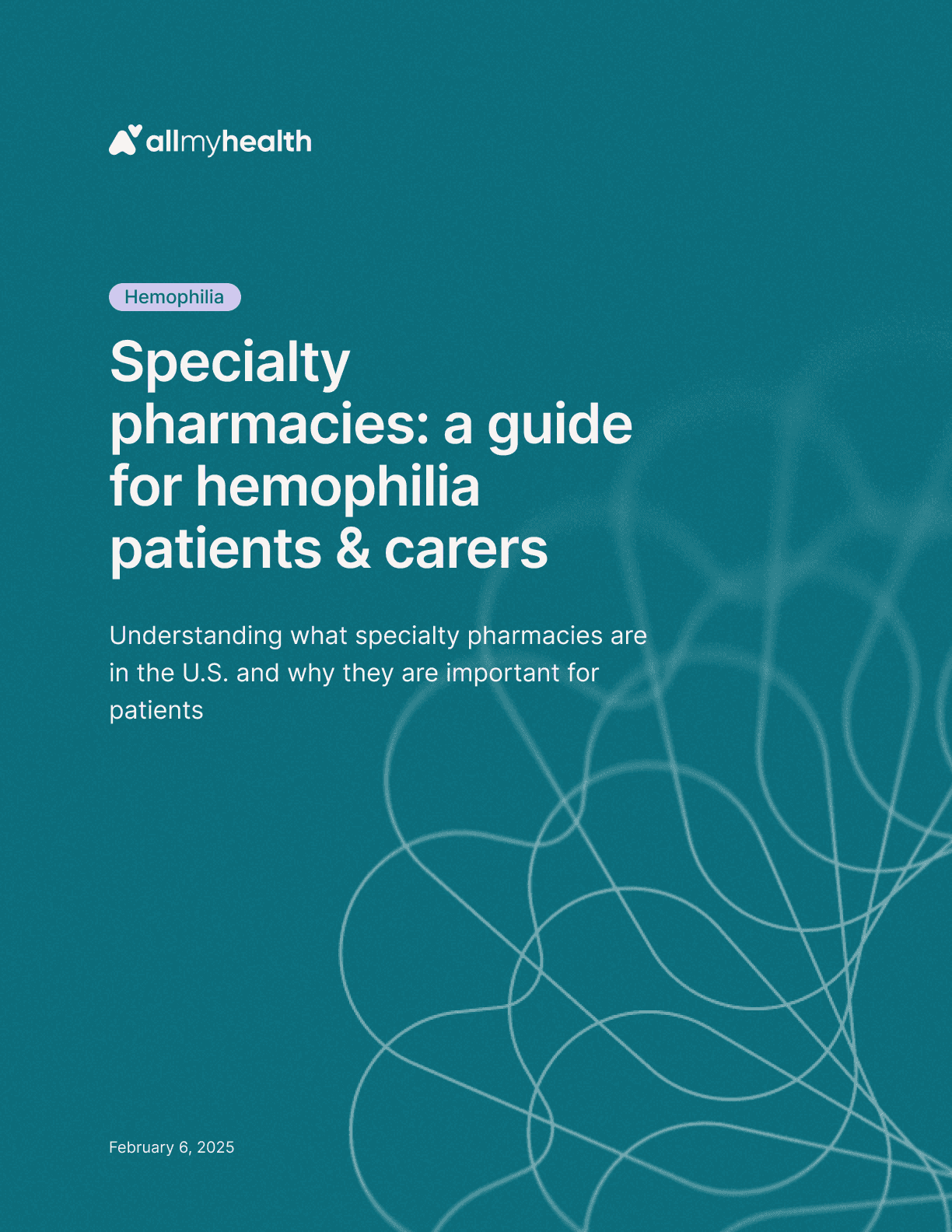
Hemophilia
·
Specialty pharmacies: a guide for hemophilia patients & carers
Feb 6, 2025

Amyotrophic lateral sclerosis
·
Specialty pharmacies: a guide for ALS patients & carers
Feb 6, 2025

Duchenne muscular dystrophy
·
Understanding Duchenne muscular dystrophy: a guide for patients
Jan 30, 2025

Friedreich's ataxia
·
Understanding Friedreich's ataxia: a guide for patients
Jan 30, 2025

Hemophilia
·
Understanding hemophilia: a guide for patients
Jan 30, 2025
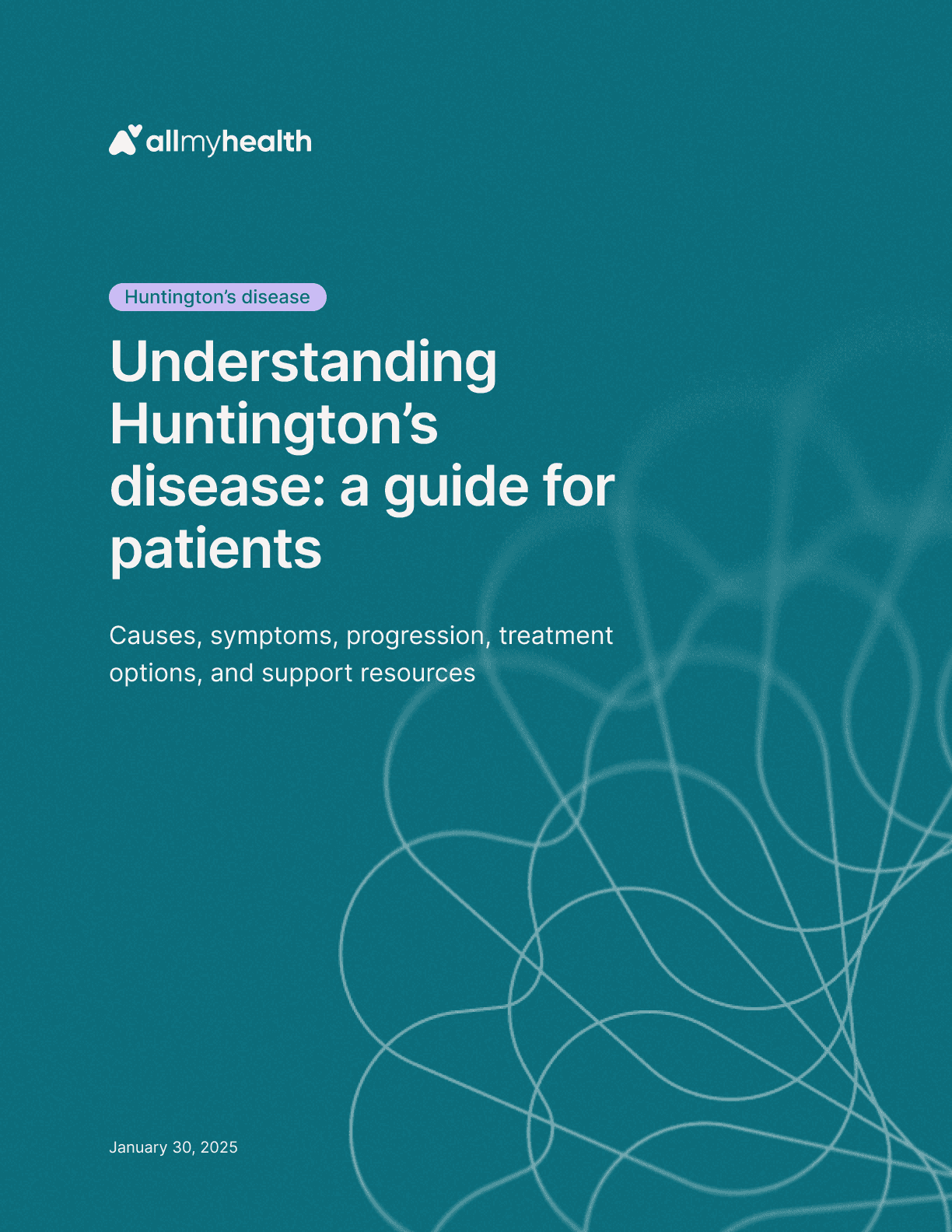
Huntington's disease
·
Understanding Huntington’s disease: a guide for patients
Jan 30, 2025
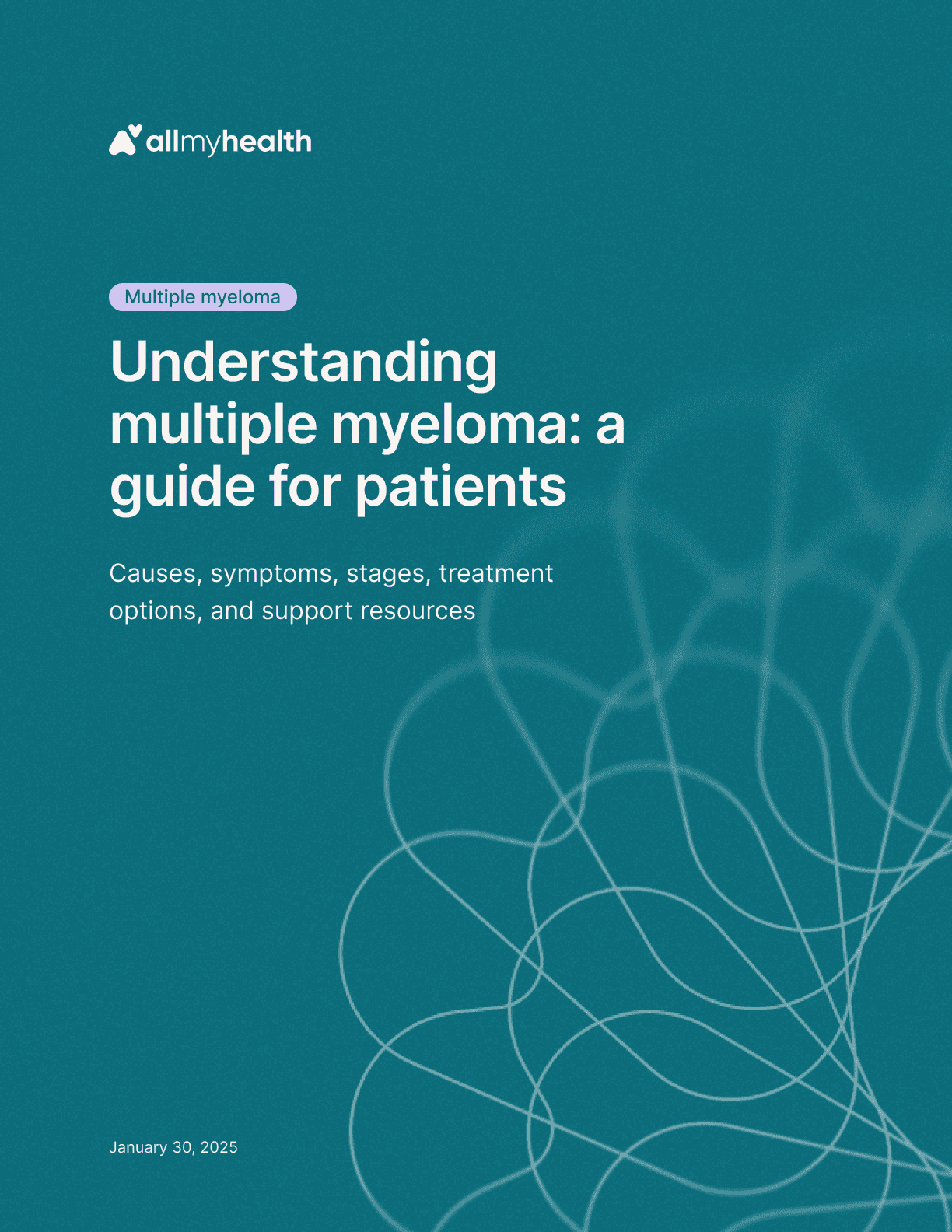
Multiple myeloma
·
Understanding multiple myeloma: a guide for patients
Jan 30, 2025

Primary biliary cholangitis
·
Understanding primary biliary cholangitis: a guide for patients
Jan 30, 2025
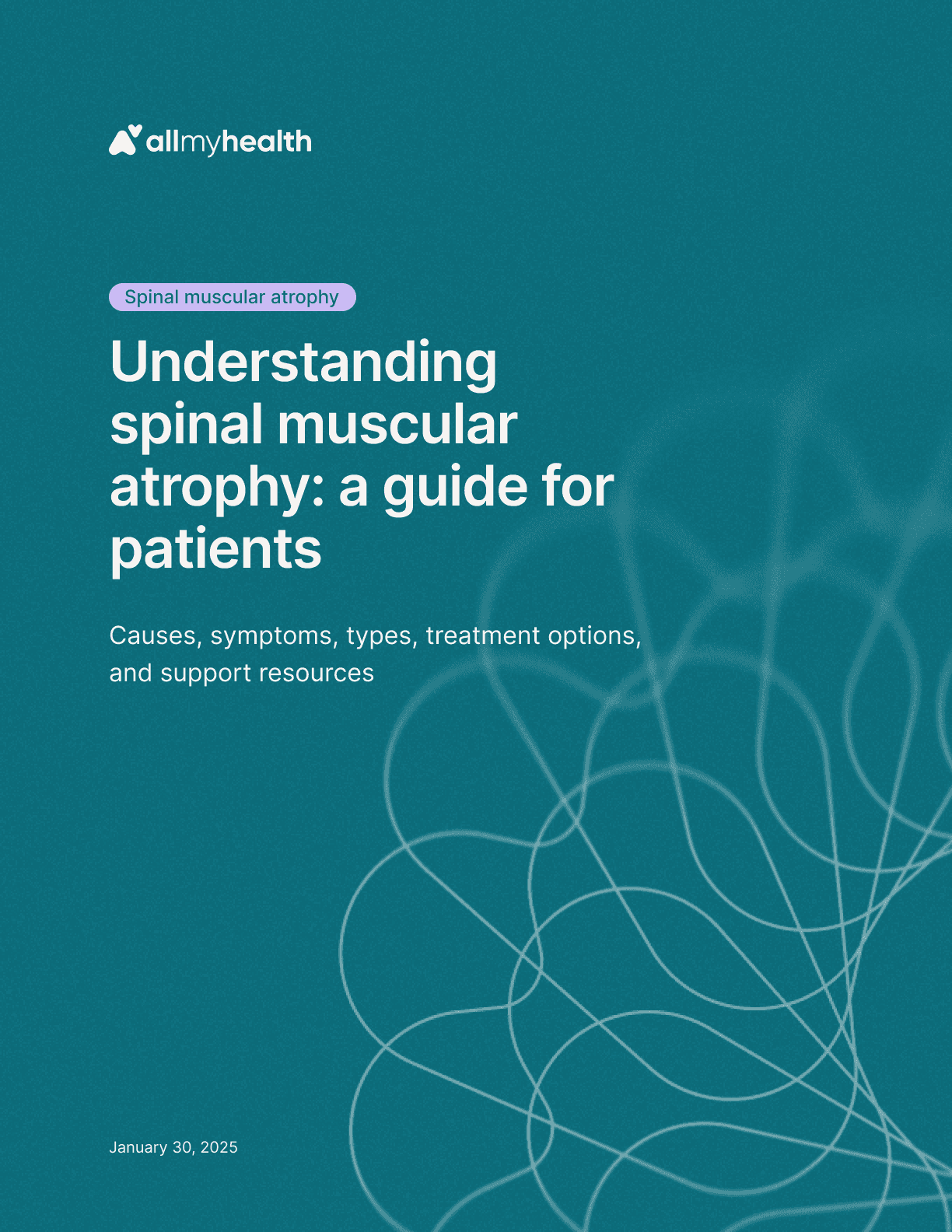
Spinal muscular atrophy
·
Understanding spinal muscular atrophy: a guide for patients
Jan 30, 2025

Amyotrophic lateral sclerosis
·
Understanding amyotrophic lateral sclerosis: a guide for patients
Jan 23, 2025
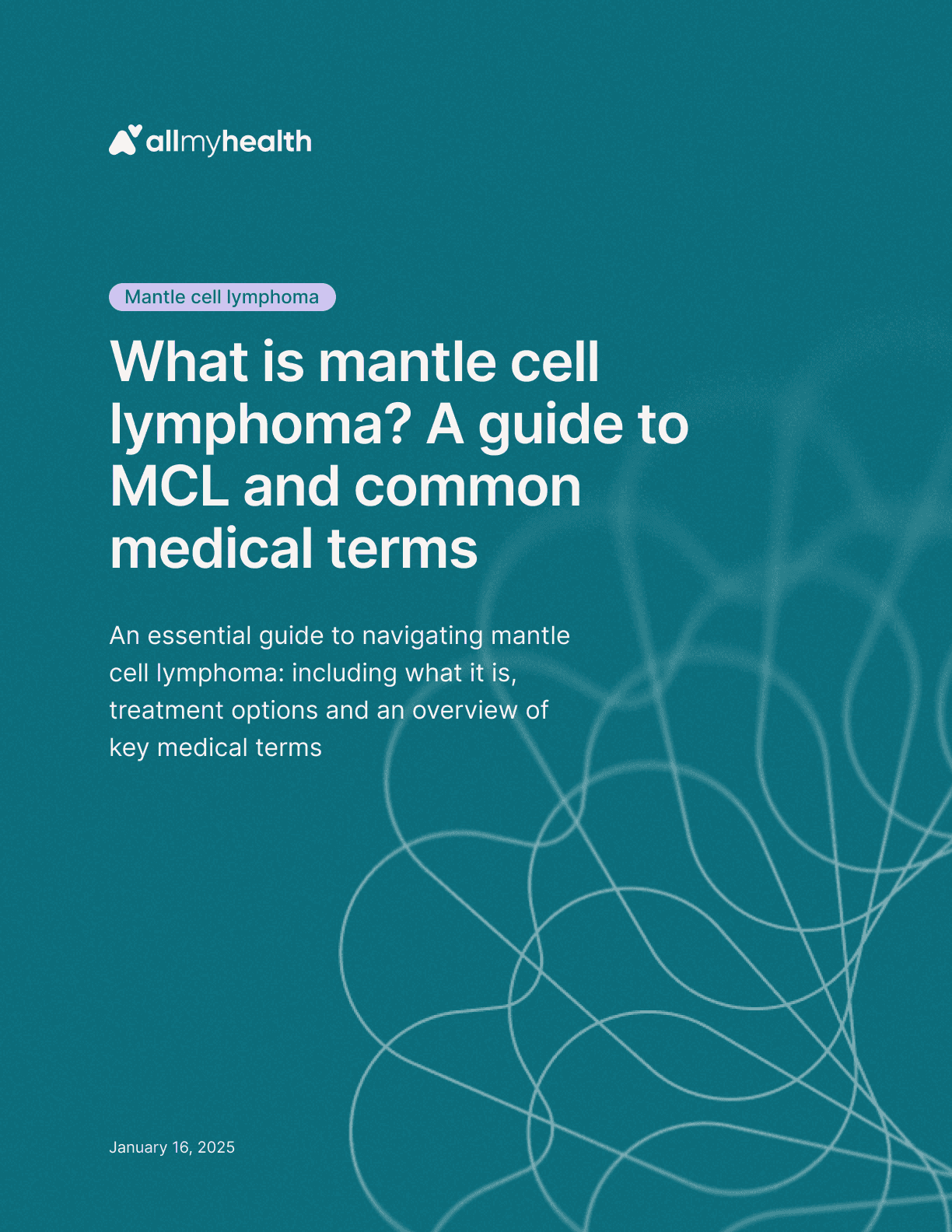
Mantle cell lymphoma
·
What is mantle cell lymphoma? A guide to MCL and common medical terms
Jan 23, 2025
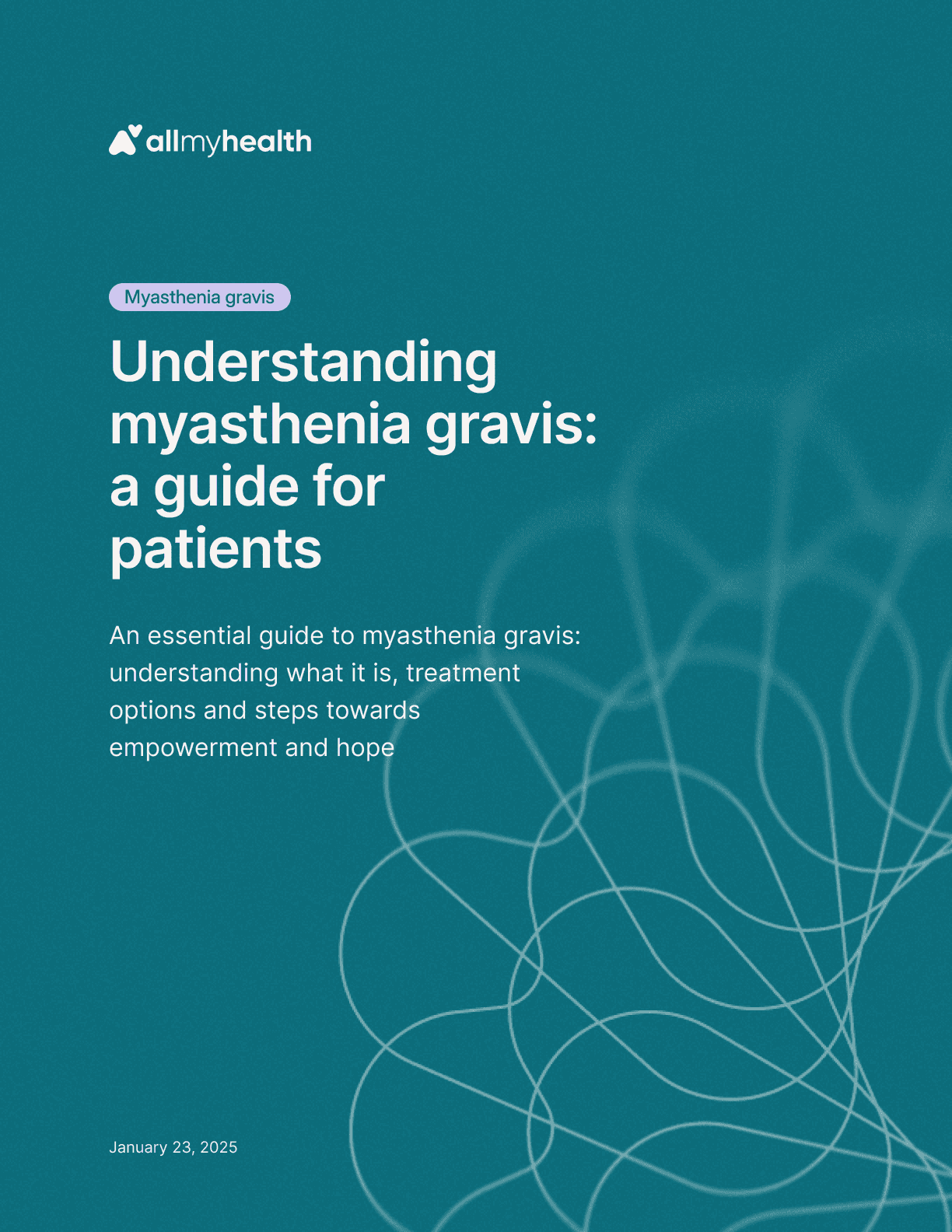
Myasthenia gravis
·
Understanding myasthenia gravis: a guide for patients
Jan 23, 2025
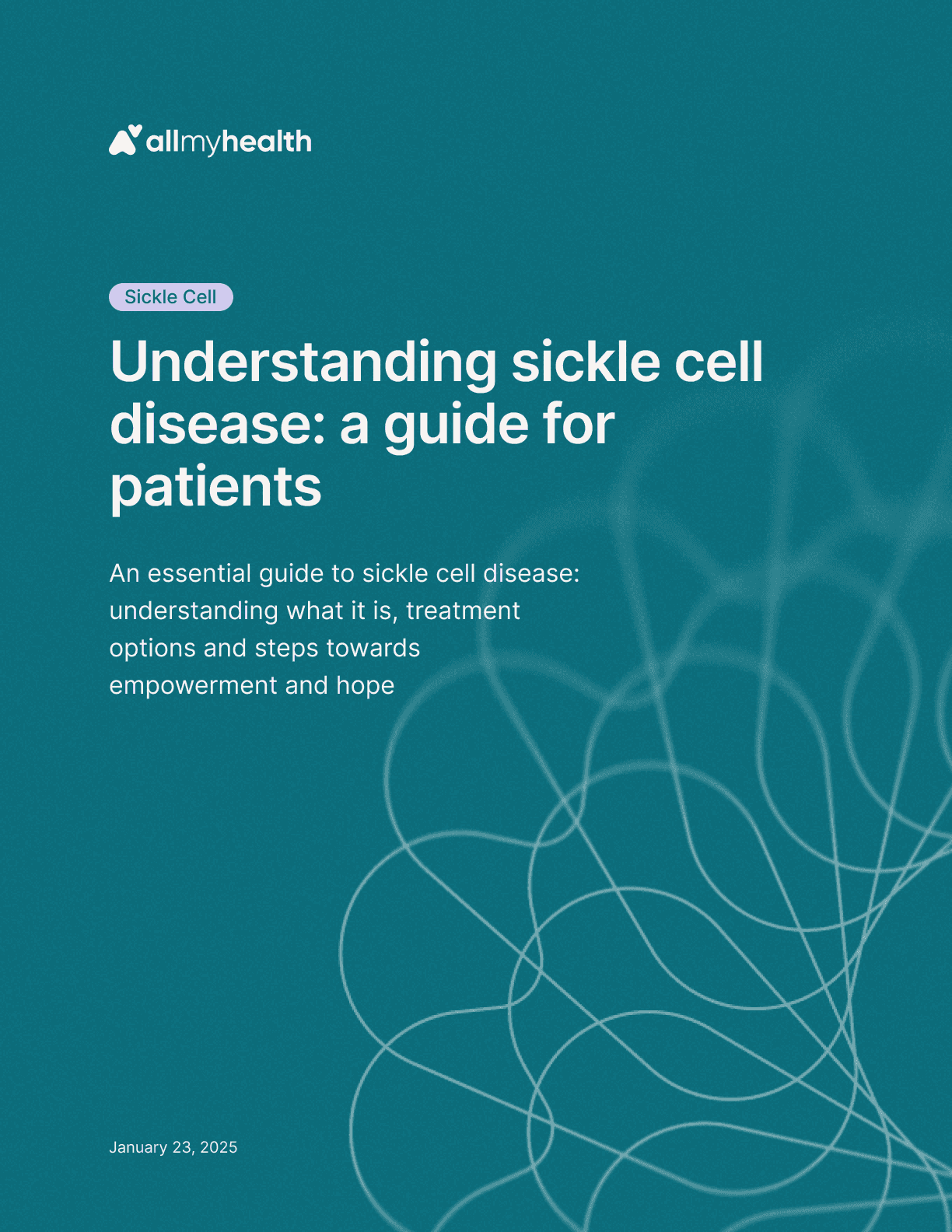
Sickle cell
·
Understanding sickle cell disease: a guide for patients
Jan 23, 2025

Primary biliary cholangitis
·
Exploring financial assistance options for primary biliary cholangitis treatment in the U.S.
Jan 17, 2025

Spinal muscular atrophy
·
Understanding financial pathways: support and resources for SMA treatment in the U.S.
Jan 17, 2025

Duchenne muscular dystrophy
·
Financial strategies for muscular dystrophy in the U.S.
Jan 17, 2025

Hemophilia
·
Navigating financial assistance for hemophilia treatment in the U.S.
Jan 17, 2025
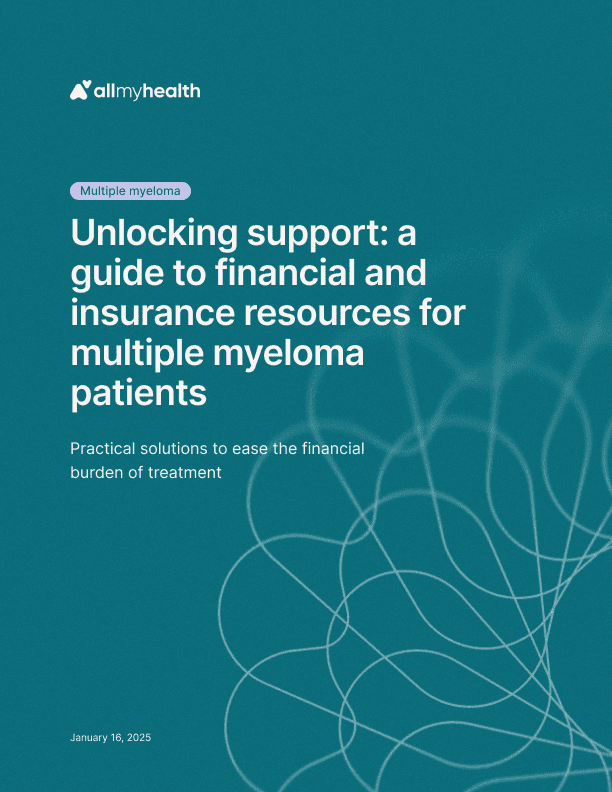
Multiple myeloma
·
Unlocking support: a guide to financial and insurance resources for multiple myeloma patients
Jan 17, 2025

Friedreich's ataxia
·
Navigating Friedreich’s ataxia in the U.S.: a practical guide to support and financial planning
Jan 17, 2025
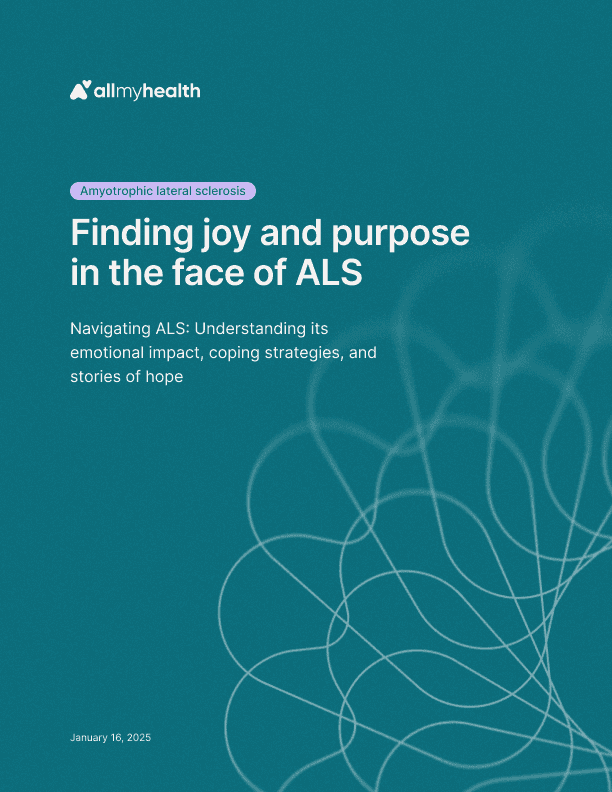
Amyotrophic lateral sclerosis
·
Finding joy and purpose in the face of ALS
Jan 16, 2025

Sickle cell
·
Thriving through the challenges: tips for managing school, work, and family with sickle cell disease
Jan 16, 2025

Myasthenia gravis
·
Financial strategies for living with myasthenia gravis in the U.S.: a guide to long-term planning
Jan 16, 2025